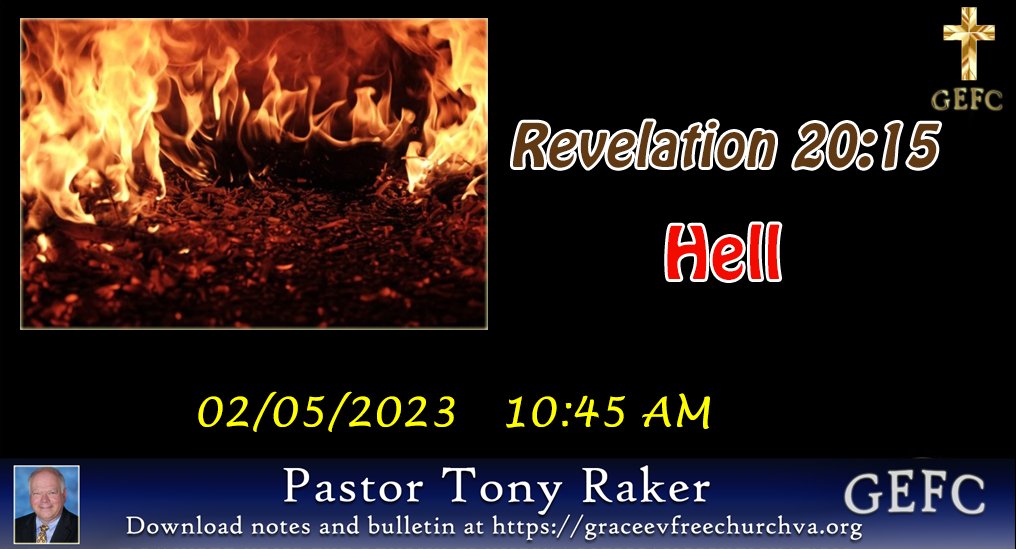
Jesus’ teaching on hell is summarized with five “R’s”:
- Reality: Jesus taught, in vivid imagery, that hell is a real place where many beings will spend eternity (Matthew 23:33, 25:41; Mark 9:43).
- Rebellion: According to Jesus, hell is a place for those who reject God, rebelling against His kingship, refusing His grace by remaining in sin (Matthew 5:22).
- Regret: Jesus does not portray hell as a pleasant place or even a neutral state. To the contrary, it is a place of torment (Mark 9:48). As the dark place outside of God’s kingdom of light, hell is full of pain and regret (Mt. 13:42; see also Matthew 22:13; 24:51; Luke 13:28).
- Relentlessness: Based on Jesus’ teaching, hell is not temporary, but everlasting. “The fire never goes out,” Jesus said (Mark 9:48). There is no exit from hell, and no respite from it or comfort in it (Luke 16:19–31).
- Reconciliation: God offers us reconciliation to avoid hell (John 5:24).
Revelation 20:15: “And if anyone’s name was not found written in the book of life, he was thrown into the lake of fire.”
- Grammatical Usage: “he was thrown” or in the Greek, “balló” meaning, “absolutely forced”; “fire” or “pur” meaning, “flame; burn”.
- Literal Interpretation: And if anyone’s name was not found written in the book of life, he was absolutely, forcibly thrown into the lake, burning with a flame.
- Contextual/Comparison: God keeps His Word: God continually uses His Word. Biblical terms describing where the dead reside:
- Sheol – a Hebrew term simply describing “the grave” or “death” – not hell
- Hades – Usually refers to hell – a place of torment ( 10:15; 16:23, etc.)
- Gehenna – (borrowed from a literal burning dump near Jerusalem) always refers to hell – a place of torment (Matthew 5:30; 23:33)
- “Lake of fire”- the final abode of unbelievers after resurrection ( 20:14, 15)
- “Abraham’s bosom” – (Luke 16:22) a place of everlasting comfort
- “Paradise” – (Luke 23:43) a place of everlasting comfort
- “With the Lord” – a key phrase describes where church age believers are after death (Philippians 1:23; 1 Thessalonians 4:17; 2 Corinthians 5:8)
Key facts about everlasting life:
(1) Everyone will exist everlastingly either in heaven or hell (Daniel 12:2, 3; Matthew 25:46; John 5:28; Revelation 20:14, 15).
(2) Everyone has only one life in which to determine their destiny (Hebrews 9:27).
(3) Heaven or hell is determined by whether a person believes (puts their trust) in Christ alone to save them (John 3:16, 36, etc.).
Key passages about Hell:
(1) Hell was designed originally for Satan/demons (Mt. 25:41; Rev. 20:10).
(2) Hell will also punish the sin of those who reject Christ (Matthew 13:41, 50; Revelation 20:11-15; 21:8).
(3) Hell is conscious torment.
Matthew 13:50 “furnace of fire…weeping and gnashing of teeth”
Mark 9:48 “where their worm does not die, and the fire is not quenched”
Revelation 14:10 “he will be tormented with fire and brimstone”
(4) Hell is everlasting and irreversible.
Revelation 14:11 “the smoke of their torment goes up forever and ever and they have no rest day and night”
Revelation 20:14 “This is the second death, the lake of fire”
Revelation 20:15 “If anyone’s name was not found written in the book of life, he was thrown into the lake of fire”
Erroneous Views of Hell:
(1) The second chance view – After death there is still a way to escape hell.
Answer: “It is appointed unto men once to die and after that the judgment” (Heb. 9:27).
(2) Universalism – All are eventually saved.
Answer: It denies the truth of salvation through Christ which means that a person decides to either trust in Christ or else he/she rejects Christ and goes to hell (John 3:16; 3:36).
(3) Annihilationism – Hell means a person dies like an animal – ceases to exist.
Answer: It denies the resurrection of the unsaved (John 5:28-29, etc. – see above). It denies conscious torment (see above).
Objections to the Biblical View of Hell:
- A loving God would not send people to a horrible hell.
Response: God is just (Romans 2:11).
God has provided the way of salvation to all (Jn. 3:16,17; 2 Cor. 5:14,15; 1 Tim. 2:6; 4:10; Titus 2:11; 2 Peter 3:9). Even those who haven’t heard of Christ are accountable for God’s revelation in nature (Rom. 1:20). God will seek those who seek Him (Mt. 7:7; Lk. 19:10). Therefore God doesn’t send people to hell, they choose it (Rom. 1:18, 21, 25).
(2) Hell is too severe a punishment for man’s sin.
Response: God is holy-perfect (1 Peter 1:14,15).
Sin is willful opposition to God our creator (Romans 1:18-32).
Our sin does merit hell (Romans 1:32; 2:2, 5, 6).
What is unfair is that Christ died to offer salvation (Rom. 2:4; 3:22-24; 4:7, 8).
- Conclusion: Knowing Christ died for to offer salvation – have you accepted Jesus as Savior?
